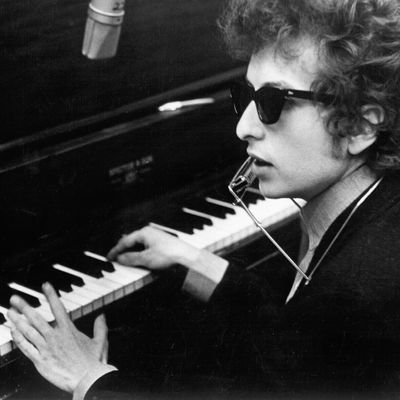
Today, Bob Dylan was awarded the 2016 Nobel Prize in Literature, joining a pantheon that includes William Butler Yeats, Hermann Hesse, Pablo Neruda, and more. It is the first time the award has gone to an American since Toni Morrison received it, in 1993. It is the only time a songwriter has won the honor. Dylan is an author: Alongside collections of his lyrics, he has published the mysterious demi-memoir Chronicles: Volume One and a deeply weird book of late-‘60s poetry, Tarantula, that only the most devout of fans could love. (From “Roping Off the Madman’s Corner”: “green maggie of profanity slapstick & her cast of seven coats shining & fighting the milkmaids & high whining barndoor slam-heavens!”) The jury’s note states that Dylan has received the award “for having created new poetic expressions within the great American song tradition.” The decision begs several questions: Are songs even literature? And is Bob Dylan the only American songwriter worthy of this honor?
The first question burns hotter than the second. On a certain level, awarding Bob Dylan a prize that goes to poets, playwrights, and authors feels a lot like giving an Oscar to a particularly gripping piece of episodic TV. A few writers have taken issue today on the grounds that Dylan’s delivery is crucial to grasping his art in full. “The distinctive thing about literature is that it involves reading silently to oneself,” Stephen Metcalf wrote today at Slate. “To read [Dylan’s] lyrics flatly, without the sound delivering them, is to experience his art reduced,” Pitchfork managing editor Matthew Schnipper said.
Yes, Bob Dylan’s words are largely understood first — and best — as music. But why not treat the Nobel as an indication that songwriting is not as limited or closely defined a literary medium as many of us believe? Through the years, Bob Dylan’s greatest triumphs as songwriter have nestled in a crawl space between the sung, spoken, and written word. The rollicking electric blues propelling a song like “Subterranean Homesick Blues” grants its shaggy string of half-thoughts a certain kinesis as a whir of images. Dylan is a master of stashing tart emotional depth inside the constant forward motion of song. We never get to isolate the ominous thing that’s happening to Mr. Jones in “Ballad of the Thin Man” or parse whether the titular lyric of “This Wheel’s on Fire” is biblical allusion or a jarring reference to the singer’s life-threatening ’66 motorcycle crash, but both streams of words convey an air of stone-faced doom without leaning on conventions like specificity or plot. Furthermore, as it’s written, a composition like “Thin Man” corrodes the lines between song, poetry, and theater so freely that mincing which medium it is or isn’t plays out like pharisaic grumbling.
It’s a mistake to understand Bob Dylan dispensing his words as song as meaning they live and die only on record. Do the three print editions of Dylan’s Lyrics not commute intent for this writing to be absorbed in print as well as on LP, CD, or MP3? Should we also split hairs about whether spoken-word poetry counts as poetry because it’s best heard aloud? Even if you think Dylan’s a better songwriter than poet, why not look at the work in toto?
All morning I’ve been asking myself “Why Dylan?” A Nobel jury could’ve named plenty of solitary songwriters in the last century for this honor. Why not Leonard Cohen? Why not Joni Mitchell? Why not a crass, craggy blues raconteur? Why not a street-smart rapper? But the longer I think about Dylan’s specific greatness as a writer, the more he makes sense as a tool for breaking out of the binary thinking that considers songwriting a lesser literary form, as mere pop art. He’s a great case for the excellence of song lyrics: At his finest, Dylan is doing something more than just rhyming pleasant words together over top of a boozy rock stomp. He’s breaking down barriers between forms — oftentimes, it would seem, on the fly.
I don’t personally need convincing of this, and I’m not sure it took a Nobel Prize (and the accompanying eight million Swedish krona) to get the point across. Dylan doesn’t really need another jewel in his pot of accolades, and rock and roll has gotten by just fine for the 60-plus years before the Nobel jury came calling. But I am accepting this move as a gateway to greater things, to a cleaner reckoning of where the great American songbook fits into the nation’s rich history of literature. I didn’t wake up thinking we still need to talk about whether a song counts as a poem or not: My rap fandom makes me think reflexively of song lyrics as poetry. But if we’re going to have it out, Bob Dylan makes a fantastic battlefield.


